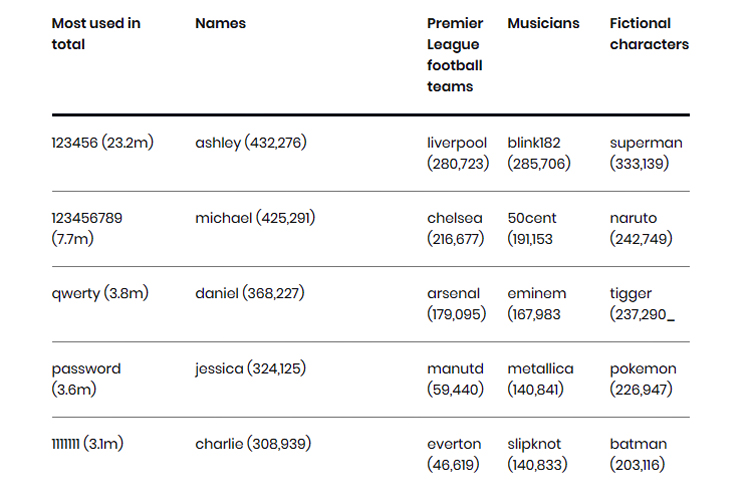Recycling is good – but not with passwords!
Tuesday, April 30th, 2019
Earlier this month, the UK’s National Cyber Security Centre (NCSC) published a list of at-risk passwords, alongside its first ‘UK Cyber Survey‘.
The list comprises the 100,000 most commonly re-occurring passwords that have been accessed by third parties in global cyber breaches. The results show a huge number of regularly used passwords, and words included within passwords, that have caused vulnerability.
Alarmingly, the list of compromised passwords was put together from global breaches that are already in the public domain, having been sold or shared by hackers.
Perhaps not surprisingly, easily the most hacked password – with more than 23 million breaches – was 123456. The third-highest (3.8m) was QWERTY and the fourth (3.6m) was ‘Password’. The table below highlights how use of your favourite football team, pop act or superhero can render you vulnerable.

The full list of 100,000 most hacked passwords can be found here. By using the ‘Find’ option on your browser you can check to see if your password is already on the list. (Examples: ‘Liverpool’ appears in 28 variants – liverpool1, liverpool, liverpool8, liverpoolfc etc – ‘Arsenal’ in 27 variants, and ‘Beyonce’ in 5 variants.)
If it is, then you should change that password immediately.
Just as importantly – maybe more so – you should guard against reusing passwords across multiple accounts. We are asked to set up usernames and passwords for so many purposes these days, and there is a natural human propensity to reuse passwords. Often we have no choice of username, which may be our e-mail address, which puts greater importance on a secure password.
Some sites and platforms will be more secure than others. A data breach at one organisation (and we constantly hear of them even at organisations we might expect to be secure) opens a realm of possibilities to hackers. By using automated software, they can try the same username and password combinations across a multitude of accounts, networks and sites. As noted above, lists obtained from breaches may be shared or sold among hackers.
The NCSC Cyber Survey demonstrated the concerns across the UK’s population about cyber security. For example:
- 42% of those surveyed expect to lose money to online fraud;
- 70% believe they will likely be a victim of at least one specific type of cyber crime over the
next two years; - Just over one in three (37%) agree that losing money or personal details over the internet is
unavoidable these days.
Carrying out the full list of online protection recommendations can seem daunting, but everyone can make a start by managing their passwords securely. Thames Valley Police advises: “use a strong password or passphrase, which is at least 12 characters long and contains a mixture of letters, numbers and symbols.” Dr Ian Levy, NCSC Technical Director, suggests: “Using hard-to-guess passwords is a strong first step and we recommend combining three random but memorable words. Be creative and use words memorable to you, so people can’t guess your password.”
And please try to avoid reusing passwords!
Liverpool may be back in top of the Premier League, but our table of breached passwords linked to teams isn’t one @LFC fans will want to be leading…https://t.co/EGpLAO5gVk pic.twitter.com/lApZgjVdmk
— NCSC UK (@NCSC) April 21, 2019
Other Recent Posts
Free webinar – Staying safe from scams, artificial intelligence (AI) fraud & cybercrime
Saturday, July 13th, 2024
Free webinar, for advice on how to spot a scam, how to report one and the ways you can protect yourself and others against them. Tuesday 16th July 2024 10:00am – 11:30am, via Microsoft Teams. Read More...
How we can help tackle industrial-scale Fly Tipping
Thursday, July 4th, 2024
Illegal waste activity is a massive cost to the economy and environment, often perpetrated by organised criminals. TVP, the Environment Agency and Buckinghamshire Council has had some significant successes recently. Read More...
Avoiding Courier Fraud
Wednesday, May 29th, 2024
Courier Fraud targets in particularly elderly and vulnerable victims. What are the signs when receiving a cold call, and what should we do? Read More...
PCC – “opting out of policing and justice is not an option”
Wednesday, May 22nd, 2024
We welcome today’s statement from the Police and Crime Commissioner, that he and Thames Valley Police agree that police action and arrests should be carried out without fear or favour, and not based on problems elsewhere in the system. Read More...
Avoiding Investment Fraud
Tuesday, May 14th, 2024
Latest tips and advice from Get Safe Online on spotting and protecting ourselves from Investment Scams Read More...
Police and Crime Commissioner: Matthew Barber reelected
Wednesday, May 8th, 2024
In a closely-run election, residents of Thames Valley reelected incumbent Police and Crime Commissioner Matthew Barber for a second term. Read More...








